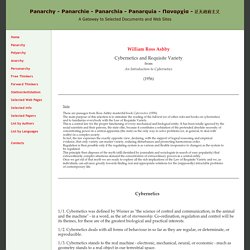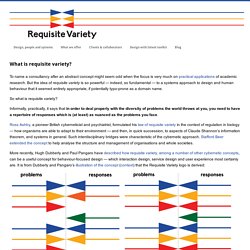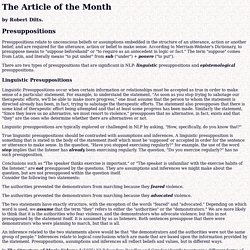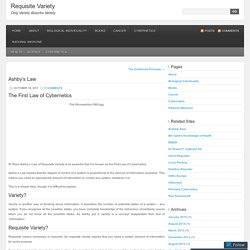

The law of requisite variety: Why flexibility and adaptability are essential for success. I first came across the law of requisite variety almost 20 years ago.

Ross Ashby proposed the idea in his 1956 book An Introduction to Cybernetics (see p.202-218), and expanded on it in his paper Requisite variety and its implications for the control of complex systems. The idea became one of the foundational concepts of the field of Cybernetics. The law is developed mathematically, using essentially what we would now consider game theory. Ashby states it as: If the varieties are measured logarithmically, this means that if the varieties of D, R, and actual outcomes are respectively Vd, Vr, and Vo then the minimal value of Vo is Vd – Vr. To make it a little more accessible, I have restated the Law of Requisite Variety (with a slight conceptual reframing) as: Last week I gave the opening keynote at Thunderhead Innovate, where I explored the changing nature of organizations and the imperatives for effective leadership today.
More on how to achieve that in another post. The law of requisite variety dilts. W. Ross Ashby, Cybernetics and Requisite Variety (1956) Cybernetics 1/1.

Cybernetics was defined by Wiener as "the science of control and communication, in the animal and the machine" - in a word, as the art of steermanship. Co-ordination, regulation and control will be its themes, for these are of the greatest biological and practical interests. 1/2. Cybernetics deals with all forms of behaviour in so far as they are regular, or determinate, or reproducible. 1/3. 1/6. One is that it offers a single vocabulary and a single set of concepts suitable for representing the most diverse types of systems. It has been found repeatedly in science that the discovery that two branches are related leads to each branch helping in the development of the other. 1/7.
In the simpler systems, the methods of cybernetics sometimes show no obvious advantage over those that have long been known. Science stands today on something of a divide. Prominent among the methods for dealing with complexity is cybernetics. The Law of Requisite Variety 9/19. 10/1. 11/2. 11/11. What is requisite variety? What is requisite variety?

To name a consultancy after an abstract concept might seem odd when the focus is very much on practical applications of academic research. But the idea of requisite variety is so powerful — indeed, so fundamental — to a systems approach to design and human behaviour that it seemed entirely appropriate, if potentially typo-prone as a domain name. So what is requisite variety? Informally, practically, it says that in order to deal properly with the diversity of problems the world throws at you, you need to have a repertoire of responses which is (at least) as nuanced as the problems you face.
Ross Ashby, a pioneer British cyberneticist and psychiatrist, formulated his law of requisite variety in the context of regulation in biology — how organisms are able to adapt to their environment — and then, in quick succession, to aspects of Claude Shannon’s information theorem, and systems in general. The Law of Requisite Variety. Article of the Month Page. By Robert Dilts.

Presuppositions relate to unconscious beliefs or assumptions embedded in the structure of an utterance, action or another belief; and are required for the utterance, action or belief to make sense. According to Merriam-Webster's Dictionary, to presuppose means to "suppose beforehand" or "to require as an antecedent in logic or fact. " The term "suppose" comes from Latin, and literally means "to put under" from sub ("under") + ponere ("to put"). There are two types of presuppositions that are significant in NLP: linguistic presuppositions and epistemological presuppositions.
Linguistic Presuppositions Linguistic Presuppositions occur when certain information or relationships must be accepted as true in order to make sense of a particular statement. Linguistic presuppositions are typically explored or challenged in NLP by asking, "How, specifically, do you know that?
" True linguistic presuppositions should be contrasted with assumptions and inferences. References. Vogus. How to Use the Law of Requisite Variety to Improve your Life. Have you ever had one of those days where it was just one thing after another going wrong?

Did you lay back and take it? Or…did you adapt to the changing situation around you to get the best possible result? Most people do the former. When problems pop up they don’t even try to fix them. And then there’s always the temptation to resort to complaining…it feels good to sit back and have a moan about things doesn’t it? Well, maybe it’s time to shake things up a bit. Because the fact of the matter is this: The most flexible person wins. This theory has been studied across numerous disciplines, but originates from cybernetics – a study of the structure of regulatory systems.
Issue 13 1 2 12 CP. Requisite Variety. The First Law of Cybernetics W.

Ross Ashby’s Law of Requisite Variety is so powerful that it is known as the First Law of Cybernetics. Ashby’s Law implies that the degree of control of a system is proportional to the amount of information available. This means you need an appropriate amount of information to control any system, whatever it is. This is a simple idea, though it is difficult to explain. The law of requisite variety and team agility. An obvious characteristic of nature's best teams is that they seem to have just the right amount of structure to handle their environments.

Too much and they would be slow and cumbersome; too little and they would lack the sophisticated responses to protect their position in the food chain. Picture Source: This raises a number of big questions for human teams: Ashby's Law of Requisite Variety and Autonomy / Stafford Beer // Javier Livas. Understanding the Law of Requisite Variety. Think Outside The Box: What is the Law of Requisite Variety? Posted on September 13, 20123 Comments You want to know one of my biggest pet peeves?

When someone relatively new to NLP uses one concept to attempt to get others to do something they don’t want to do. Key word “attempt.” (Please keep in mind that my first NLP training was in 1982, so after having been in this field for 30 years, many people I meet are relatively new…) To begin, The Empowerment Partnership has been in business now for 30 years. My word is so important to me. Case in point: I have already let some students know that there is a cut off for enrollment into a specific class. This is true at Huna, Master Practitioner, Trainer’s Training and so on. Application of Law of Requisite Variety in Inter-Organizational Information Processing Management. CR 2009 04 E5. 1409. The Law of Requisite Variety. What is the law of requisite variety in the context of the environment and ecology? - Quora.